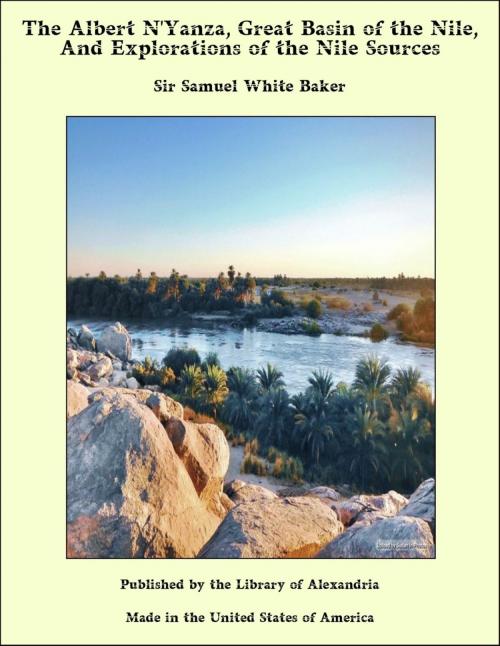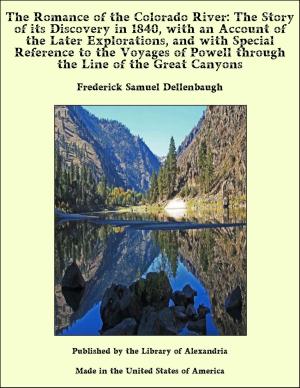The Albert N'Yanza, Great Basin of the Nile, And Explorations of the Nile Sources
Nonfiction, Religion & Spirituality, New Age, History, Fiction & Literature| Author: | Sir Samuel White Baker | ISBN: | 9781465615213 |
| Publisher: | Library of Alexandria | Publication: | March 8, 2015 |
| Imprint: | Language: | English |
| Author: | Sir Samuel White Baker |
| ISBN: | 9781465615213 |
| Publisher: | Library of Alexandria |
| Publication: | March 8, 2015 |
| Imprint: | |
| Language: | English |
The primary object of geographical exploration is the opening to general intercourse such portions of the earth as may become serviceable to the human race. The explorer is the precursor of the colonist; and the colonist is the human instrument by which the great work must be constructed—that greatest and most difficult of all undertakings—the civilization of the world. The progress of civilization depends upon geographical position. The surface of the earth presents certain facilities and obstacles to general access; those points that are easily attainable must always enjoy a superior civilization to those that are remote from association with the world. We may thus assume that the advance of civilization is dependent upon facility of transport. Countries naturally excluded from communication may, through the ingenuity of man, be rendered accessible; the natural productions of those lands may be transported to the seacoast in exchange for foreign commodities; and commerce, thus instituted, becomes the pioneer of civilization. England, the great chief of the commercial world, possesses a power that enforces a grave responsibility. She has the force to civilize. She is the natural colonizer of the world. In the short space of three centuries, America, sprung from her loins, has become a giant offspring, a new era in the history of the human race, a new birth whose future must be overwhelming. Of later date, and still more rapid in development, Australia rises, a triumphant proof of England's power to rescue wild lands from barrenness; to wrest from utter savagedom those mighty tracts of the earth's surface wasted from the creation of the world,—a darkness to be enlightened by English colonization. Before the advancing steps of civilization the savage inhabitants of dreary wastes retreated: regions hitherto lain hidden, and counting as nothing in the world's great total, have risen to take the lead in the world's great future. Thus England's seed cast upon the earth's surface germinates upon soils destined to reproduce her race. The energy and industry of the mother country become the natural instincts of her descendants in localities adapted for their development; and wherever Nature has endowed a land with agricultural capabilities, and favourable geographical position, slowly but surely that land will become a centre of civilization. True Christianity cannot exist apart from civilization; thus, the spread of Christianity must depend upon the extension of civilization; and that extension depends upon commerce.
The primary object of geographical exploration is the opening to general intercourse such portions of the earth as may become serviceable to the human race. The explorer is the precursor of the colonist; and the colonist is the human instrument by which the great work must be constructed—that greatest and most difficult of all undertakings—the civilization of the world. The progress of civilization depends upon geographical position. The surface of the earth presents certain facilities and obstacles to general access; those points that are easily attainable must always enjoy a superior civilization to those that are remote from association with the world. We may thus assume that the advance of civilization is dependent upon facility of transport. Countries naturally excluded from communication may, through the ingenuity of man, be rendered accessible; the natural productions of those lands may be transported to the seacoast in exchange for foreign commodities; and commerce, thus instituted, becomes the pioneer of civilization. England, the great chief of the commercial world, possesses a power that enforces a grave responsibility. She has the force to civilize. She is the natural colonizer of the world. In the short space of three centuries, America, sprung from her loins, has become a giant offspring, a new era in the history of the human race, a new birth whose future must be overwhelming. Of later date, and still more rapid in development, Australia rises, a triumphant proof of England's power to rescue wild lands from barrenness; to wrest from utter savagedom those mighty tracts of the earth's surface wasted from the creation of the world,—a darkness to be enlightened by English colonization. Before the advancing steps of civilization the savage inhabitants of dreary wastes retreated: regions hitherto lain hidden, and counting as nothing in the world's great total, have risen to take the lead in the world's great future. Thus England's seed cast upon the earth's surface germinates upon soils destined to reproduce her race. The energy and industry of the mother country become the natural instincts of her descendants in localities adapted for their development; and wherever Nature has endowed a land with agricultural capabilities, and favourable geographical position, slowly but surely that land will become a centre of civilization. True Christianity cannot exist apart from civilization; thus, the spread of Christianity must depend upon the extension of civilization; and that extension depends upon commerce.















